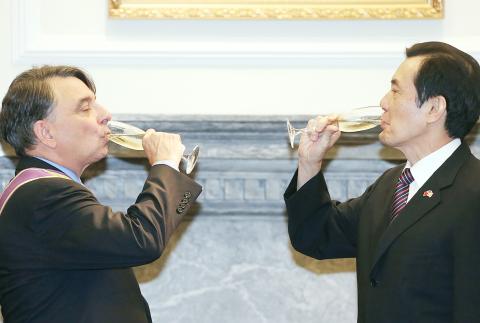President Ma Ying-jeou (馬英九) yesterday praised American Institute in Taiwan Director William Stanton for his decision to stay in Taiwan after he retires and for fostering US-Taiwan ties during his tenure.
Bilateral relations between Taiwan and the US over the past three years have been at their closest and most stable since official diplomatic ties were severed in 1979, Ma wrote on his Facebook page.
For example, the US sent high-ranking government officials to visit Taiwan on a number of occasions in the past few years, Ma said, despite the absence of formal ties between the two sides.

Photo: CNA
Stanton has also been working hard to help Taiwan gain visa-waiver status in the US, Ma said, but what has touched him most was how “Stanton used his actions to show his love for Taiwan.”
Ma added that Stanton, 65, is one of the few US envoys to have traveled so extensively in Taiwan, and is the first US diplomat to choose to stay in the country after leaving the diplomatic corps.
Stanton, who is scheduled to retire later this month, will take a teaching position at Taipei American School. Stanton was awarded the Order of Brilliant Star by Ma on Tuesday for his contribution to bilateral relations. Ma also gave the diplomat, who dislikes driving, a customized EasyCard.
Stanton is the third foreign representative who has decided to stay in Taiwan after retiring, Ma said on his Facebook page, adding that Henrik Bystrom of Sweden and Menno Goedhart of the Netherlands have both chosen to reside in Taiwan and apply for permanent residency to become “true Taiwanese.”

A preclearance service to facilitate entry for people traveling to select airports in Japan would be available from Thursday next week to Feb. 25 at Taiwan Taoyuan International Airport, Taoyuan International Airport Corp (TIAC) said on Tuesday. The service was first made available to Taiwanese travelers throughout the winter vacation of 2024 and during the Lunar New Year holiday. In addition to flights to the Japanese cities of Hakodate, Asahikawa, Akita, Sendai, Niigata, Okayama, Takamatsu, Kumamoto and Kagoshima, the service would be available to travelers to Kobe and Oita. The service can be accessed by passengers of 15 flight routes operated by

Alain Robert, known as the "French Spider-Man," praised Alex Honnold as exceptionally well-prepared after the US climber completed a free solo ascent of Taipei 101 yesterday. Robert said Honnold's ascent of the 508m-tall skyscraper in just more than one-and-a-half hours without using safety ropes or equipment was a remarkable achievement. "This is my life," he said in an interview conducted in French, adding that he liked the feeling of being "on the edge of danger." The 63-year-old Frenchman climbed Taipei 101 using ropes in December 2004, taking about four hours to reach the top. On a one-to-10 scale of difficulty, Robert said Taipei 101

Taiwanese and US defense groups are collaborating to introduce deployable, semi-autonomous manufacturing systems for drones and components in a boost to the nation’s supply chain resilience. Taiwan’s G-Tech Optroelectronics Corp subsidiary GTOC and the US’ Aerkomm Inc on Friday announced an agreement with fellow US-based Firestorm Lab to adopt the latter’s xCell, a technology featuring 3D printers fitted in 6.1m container units. The systems enable aerial platforms and parts to be produced in high volumes from dispersed nodes capable of rapid redeployment, to minimize the risk of enemy strikes and to meet field requirements, they said. Firestorm chief technology officer Ian Muceus said

MORE FALL: An investigation into one of Xi’s key cronies, part of a broader ‘anti-corruption’ drive, indicates that he might have a deep distrust in the military, an expert said China’s latest military purge underscores systemic risks in its shift from collective leadership to sole rule under Chinese President Xi Jinping (習近平), and could disrupt its chain of command and military capabilities, a national security official said yesterday. If decisionmaking within the Chinese Communist Party has become “irrational” under one-man rule, the Taiwan Strait and the regional situation must be approached with extreme caution, given unforeseen risks, they added. The anonymous official made the remarks as China’s Central Military Commission Vice Chairman Zhang Youxia (張又俠) and Joint Staff Department Chief of Staff Liu Zhenli (劉振立) were reportedly being investigated for suspected “serious